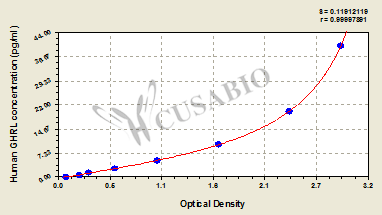Ghrelin is a peptide hormone primarily produced by ghrelinergic cells in the gastrointestinal tract, particularly the stomach fundus. This 28-amino acid hormone regulates appetite and energy homeostasis by stimulating growth hormone release and promoting food intake. Ghrelin levels typically rise before meals and fall after eating, making it a key regulator of hunger and satiety. The hormone also influences gastric motility, glucose metabolism, and cardiovascular function. These properties make ghrelin important in metabolic research and studies of eating disorders, obesity, and metabolic syndrome.
The Human Ghrelin ELISA Kit (CSB-E13398h) provides quantitative measurement of ghrelin/obestatin prepropeptide in human samples. This sandwich-based assay works with serum, plasma, cell culture supernatants, and tissue homogenates. The detection range spans 0.625-40 pg/mL with sensitivity of 0.156 pg/mL. The assay requires 50-100 μL sample volume and can be completed within 1-5 hours, with detection performed at 450 nm wavelength.
Application Examples
Note: The following application examples are drawn from a selection of publications citing this product. For additional applications, please refer to the full list of references in the "Citations" section.
This ELISA kit has been used in clinical research studies to measure ghrelin levels in human serum and plasma samples. The applications span metabolic and endocrine research contexts where ghrelin quantification serves as a biomarker for various physiological conditions.
• Metabolic research: Measurement of fasting serum ghrelin concentrations in studies examining metabolic parameters and hormonal profiles
• Endocrine profiling: Quantification of both acyl and desacyl ghrelin forms in plasma samples as part of comprehensive hormone analysis
• Clinical biomarker studies: Analysis of ghrelin levels in peripheral blood samples from human subjects in controlled research settings
• Comparative studies: Analysis of ghrelin concentrations alongside other metabolic hormones to study hormonal interactions and regulatory pathways






